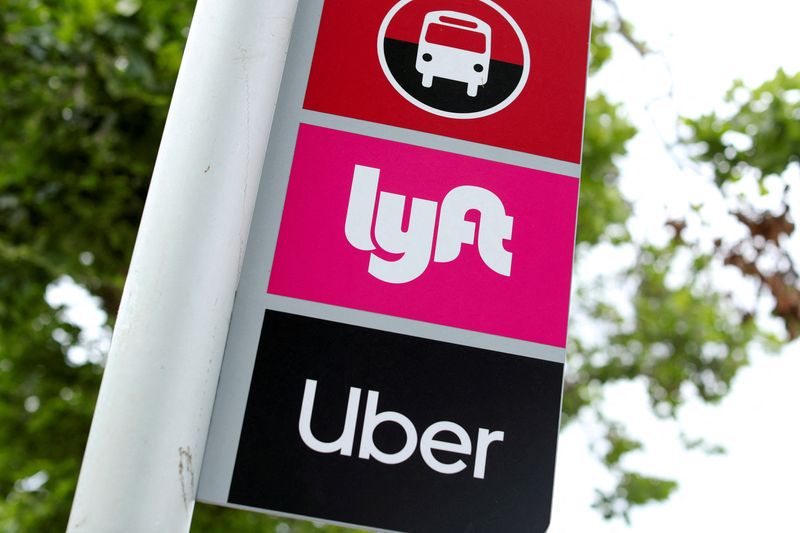By Daniel Wiessner
(Reuters) -Judges on California's top court on Tuesday considered whether voters had the power to allow app-based services such as Uber (NYSE:UBER) and Lyft (NASDAQ:LYFT) to classify drivers in the state as independent contractors rather than as employees with greater benefits.
The seven-member California Supreme Court heard oral arguments in San Francisco in a lawsuit by the Service Employees International Union (SEIU) and four drivers who say a 2020 ballot measure known as Proposition 22 was unconstitutional.
The measure exempts app-based drivers from a 2019 state law that narrowed the circumstances in which many workers can be treated as contractors.
Whether gig workers should be treated as employees or contractors is a crucial issue for the ride service industry, Employees are entitled to the minimum wage, overtime pay, reimbursements for expenses and other protections that do not extend to independent contractors, who as a result can cost companies up to 30% less, according to several studies.
Uber, Lyft and other app-based services spent more than $200 million on a campaign to pass Prop 22 and have said that without it, the increased costs could force them to stop doing business in California, the largest U.S. state.
Prop 22, which was passed in November 2020 by nearly 60% of voters in California, allows app-based transportation services to classify drivers as independent contractors as long as they are paid at least 120% of the minimum wage while passengers are in the car and drivers receive expense reimbursements and subsidies to pay for health insurance.
A lower appeals court last year rejected SEIU's argument that Prop 22 improperly limited the legislature's exclusive power to regulate the state's workers' compensation system by barring app-based drivers from receiving those benefits, which are only granted to employees.
Most of Tuesday's arguments revolved around whether that authority, outlined in the state constitution, was truly exclusive.
At least three judges suggested that California's constitution requires the legislature to share lawmaking power with the electorate, just as it mandates that bills must be presented to the governor before they become law.
They told SEIU's lawyer Scott Kronland that if the legislature disapproves of Prop 22 it could pass laws extending benefits to app-based drivers.
"Prop 22 … only speaks of the classification as employees or independent contractors for the purposes of the labor code,” Justice Goodwin Liu said, referring to California employment law. “But the labor code is not frozen in time.”
Kronland told the court that a provision in Prop 22 barring any amendments would make it difficult for lawmakers to counteract the measure.
At the same time, the judges seemed skeptical of some arguments by the state and Protect App-Based Drivers and Services, an industry-backed group that intervened in the case to defend Prop 22.
Two judges suggested that giving voters control over the workers' compensation system meant that they could eliminate it altogether, which would seem to infringe on the "plenary" - or absolute - power that the constitution grants to the legislature.
That "turns ‘plenary’ into ‘it’s plenary until it’s nothing.’ That doesn’t feel very plenary to me,” Justice Joshua Groban said.
NATIONWIDE BATTLE
California is just one front in a nationwide legal battle over the classification of gig drivers and other contract workers. Lawmakers in Minnesota passed a measure over the weekend that would set a minimum wage of $1.28 per mile and 31 cents per minute for gig drivers, replacing a higher minimum adopted by Minneapolis that spurred Uber and Lyft to threaten to cease operating in the city.
Earlier this month, the top court in Massachusetts heard arguments over whether competing ballot proposals that would redefine the relationship between app-based companies and drivers should be allowed to go before voters in November. One proposal supported by industry groups mirrors Prop 22, while another would allow drivers to unionize.

Last week a trial kicked off in a lawsuit by the Massachusetts attorney general accusing Uber and Lyft of unlawfully classifying drivers as contractors to avoid treating them as employees entitled to a minimum wage, overtime and earned sick time.
The California Supreme Court typically issues rulings within 90 days of hearing arguments.